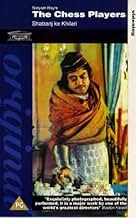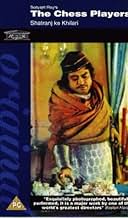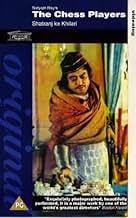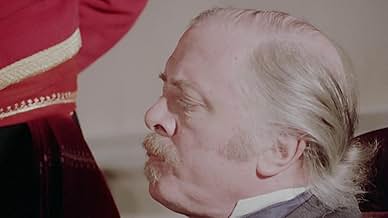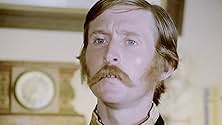IMDb RATING
7.5/10
4.3K
YOUR RATING
In 1856, two obsessed noblemen ignore everything while playing chess and fail to notice British rule extending into their Indian province.In 1856, two obsessed noblemen ignore everything while playing chess and fail to notice British rule extending into their Indian province.In 1856, two obsessed noblemen ignore everything while playing chess and fail to notice British rule extending into their Indian province.
- Awards
- 4 wins & 3 nominations total
Victor Banerjee
- Prime Minister
- (as Victor Bannerji)
Farooq Shaikh
- Aqueel
- (as Farooque Shaikh)
Bhudo Advani
- Abbajani
- (as Budho Advani)
7.54.3K
1
2
3
4
5
6
7
8
9
10
Featured reviews
Checkmate? You better check your wife, mate!
Shatranj Ke Khilari is Sayajit Ray's first Hindi movie. It is, though a bit too slow at points, special, different, comic, and as a result unusually entertaining. This satirical drama is humorous, interesting and impressive, and Ray's direction is excellent. It is evidently well invested, with glossy sets and costumes. The writing is superb, with the brilliantly-written dialogues surpassing the storyline itself, and the culture and the atmosphere of those times is captured exceedingly well. All these aspects, along with the music composed by Ray and the fantastic narration of Amitabh Bachchan, create an engagingly artistic and poetic piece. Ray casts some of the most talented leading actors from the Hindi film industry, all of whom suit their roles and do a wonderful job. Amjad Khan is great as Nawab Wajid Ali Shah. Sanjeev Kumar and Saeed Jaffrey are exceptional as the chess-obsessed noblemen, who ironically indulge in ceaseless chess playing while showing minimal interest in the state of their marriages, wives and even their nation. Shabana Azmi and Farida Jalal play their neglected wives, and they excel in their very tiny roles (each has only a few minutes on-screen). Azmi is convincing as the frustrated Khurshid and Jalal is awesome as the unfaithful wife who has an affair with her husband's nephew Aqueel. Richard Attenbrough and Victor Banerjee provide great support. Shatranj Ke Khilari is a nice little film. It is not among the very best of Ray, but it is certainly a worthy picture and of the most strikingly unique films of those times.
Another Ray classic !!
Shatranj Ke Khilari is the first Hindi film by who is undoubtedly the best film-maker India has ever had. Satyajit Ray made this movie in 1977, having established his reputation worldwide as an ace director with his Bengali art pieces.
Based in mid 19th century, this is an account of the British annexation of one of the last independent kingdoms of India, Awadh. The British, by that year, have quite a firm hold on the subcontinent and are keen to swallow down everything that has not yet been under their direct control. So the East India Company and its representative General Outram decide that it was time for the ruling king, Nawab Wajid Ali Shah to step down from his throne.
Wajid Ali Shah, the king, is that only by name. He is an indifferent ruler whose days and nights are occupied not with the affairs of state, but the artistic charms of music, poetry and dance. He is a ruler who finds it convenient to leave the important matters regarding his kingdom to his subordinates, while he indulges in life's countless pleasures. Inevitably, the British, sensing a weak king, are tempted to take over the control of the province.
Meanwhile, two of the king's friends, Mirza Sajid Ali and Mir Roshan Ali are busy satisfying their own personal urges. In a time when the king needs their help desperately, they engage all day in the old Indian game of Chess. Oblivious and indifferent to what is happening to Lucknow and their own private household, these chess-crazy men spend days challenging each other to games of a sport played with soldiers which are not real, but wooden pieces which move on a small 64-squared board. Their inconsequential moves on that board act as a substitute to the possible resistance they could have shown to the British takeover.
It is extremely difficult to find flaws in such a movie. As with all Ray movies, this movie doesn't have too much of a storyline to boast about. This is just a beautiful account which epitomizes the kind of inactivity and submission our country had sunk into in those times. The acting is, as expected, spotless. Everyone has done his part to perfection. The direction and camera-work are as good as any other Ray movie. The dialogues are as precise as we have got from movies like Umrao Jaan or Mughal-E-Azam. Each and every line spoken is worth listening to again and again. As an added attraction, Amitabh Bachchan has lent his voice for the narration, which is something he has done quite well.
The pace of the movie being slow, it is of course not everyone's cup of tea. But this movie is a must-watch for its brilliant acting and direction. And no other form of art can possibly be more expressive of the Indian mentality back in the 19th century.
Based in mid 19th century, this is an account of the British annexation of one of the last independent kingdoms of India, Awadh. The British, by that year, have quite a firm hold on the subcontinent and are keen to swallow down everything that has not yet been under their direct control. So the East India Company and its representative General Outram decide that it was time for the ruling king, Nawab Wajid Ali Shah to step down from his throne.
Wajid Ali Shah, the king, is that only by name. He is an indifferent ruler whose days and nights are occupied not with the affairs of state, but the artistic charms of music, poetry and dance. He is a ruler who finds it convenient to leave the important matters regarding his kingdom to his subordinates, while he indulges in life's countless pleasures. Inevitably, the British, sensing a weak king, are tempted to take over the control of the province.
Meanwhile, two of the king's friends, Mirza Sajid Ali and Mir Roshan Ali are busy satisfying their own personal urges. In a time when the king needs their help desperately, they engage all day in the old Indian game of Chess. Oblivious and indifferent to what is happening to Lucknow and their own private household, these chess-crazy men spend days challenging each other to games of a sport played with soldiers which are not real, but wooden pieces which move on a small 64-squared board. Their inconsequential moves on that board act as a substitute to the possible resistance they could have shown to the British takeover.
It is extremely difficult to find flaws in such a movie. As with all Ray movies, this movie doesn't have too much of a storyline to boast about. This is just a beautiful account which epitomizes the kind of inactivity and submission our country had sunk into in those times. The acting is, as expected, spotless. Everyone has done his part to perfection. The direction and camera-work are as good as any other Ray movie. The dialogues are as precise as we have got from movies like Umrao Jaan or Mughal-E-Azam. Each and every line spoken is worth listening to again and again. As an added attraction, Amitabh Bachchan has lent his voice for the narration, which is something he has done quite well.
The pace of the movie being slow, it is of course not everyone's cup of tea. But this movie is a must-watch for its brilliant acting and direction. And no other form of art can possibly be more expressive of the Indian mentality back in the 19th century.
Satyajit Ray is a true legend
This was my first Satyajit Ray movie. And I have to tell you that he truly deserved the lifetime Oscar that he got. The movie is a true classic. And Sanjeev Kumar proves again that what a class actor he is. Sayeed Jaffery and Amjad khan were also very good. The camera angles used in the movie were simply terrific. Especially that scene in which Sayeed Jaffery changes the pawns. This movie however I might say that is not for a regular movie viewer. As the story is slow and you get to know what a real art movie is. I hope Satyajit Ray would have made some more Hindi films for the Hindi viewers. I really loved it and would recommend it to anyone who loves art movies. A true gem of a movie.
British Policy in India
The Chess Players is a curious film by the famed Indian director Satyajit Ray. Half in Hindi and half in English which is curious in itself. The story is about the take over of the Kingdom of Oudh, capital Lucknow, by the British. It shows the complete deceit of the British in their takeover of the Indian Sub Continent using underhand methods based in their emasculation of the Indian rulers. The Nawab of Oudh is a cultured Muslim ruler in the tradition of The Moghuls. The qualities admired by the culture of the time were not militaristic and patriarchal but cultural and aesthetic. The Nawab often sang songs to his people and danced for them or read poetry and wrote it of course. This was considered by the British to show signs of effeminacy and not good government. I fact the subjects of the Nawab who were for the most part Hindus, loved their Ruler for precisely these qualities and even though he was of a different faith, lived happily in a cultural paradise. The British represented by Richard Attenborough show a total lack of understanding of this culture and in a cynical move annex the kingdom and send the Nawab into exile.There was interestingly enough, no attempt at resistance but a bland acceptance of the will of God. Strangely sad and haunting film from one of India's greatest directors since Independence. Trivia. Lucknow was the city that Cliff Richard was born in and lived as a child before Independence.
Ray's unique gift
This movie is a precious gem. I have not seen anything like it and only a rare amount of movies dare to be as different. One cannot expect any less from Satyajit Ray, one of India's greatest filmmakers. Shatranj ke Khiladi is a satirical comedy that stars the best actors delivering the finest performances. Amjad Khan and Saeed Jaffrey definitely did their best for this movie. Sanjeev Kumar and Shabana Azmi are excellent as always. Richard Attenborough and Victor Banerjee do very well with their small roles. I was also surprised to see Farida Jalal in a negative comic role as an unfaithful wife. Ray also applies his artistic talents in set designs as you'll see some beautiful paintings. Background music is limited but used effectively. The movie was shot brilliantly where it is quite evident that the director has given attention to very little detail. There is one scene where Sanjeev Kumar goes to his room to see his wife. Saeed Jaffrey is waiting for him. We soon see a scene where Jaffrey goes to check on Sanjeev then when he returns...we see a hand changing the position on the chess board. This is just one of the finest example of excellent direction, among the many you'll witness in this classic masterpiece. The events of the 19th century are portrayed very poetically. While some may say that the pace is slow, it did not bore me one bit and there was always something happening. This, indeed, is a fine piece of film-making. I suggest you go and watch it.
Did you know
- TriviaSanjeev Kumar stated that the film flopped due to the masses not understanding the film. The pace was quite slow and scenes lengthy. The scene between Tom Alter and Richard Attenbourogh were too stretched. The English dialogue just added up to its failure.
- Quotes
Mir Roshan Ali: Jinse apni biwi-yan nahin sambhli woh angreaz fauz se kya ladenge. Translation : Those whom couldn't even care for their wives, would not be able to fight the British army.
- ConnectionsFeatured in Celluloid Man (2012)
- How long is The Chess Players?Powered by Alexa
Details
- Release date
- Country of origin
- Languages
- Also known as
- Die Schachspieler
- Filming locations
- Indrapuri Studios, Calcutta, West Bengal, India(studio: Indrapuri Studios, Calcutta)
- Production company
- See more company credits at IMDbPro
- Runtime
- 2h 9m(129 min)
- Sound mix
Contribute to this page
Suggest an edit or add missing content



